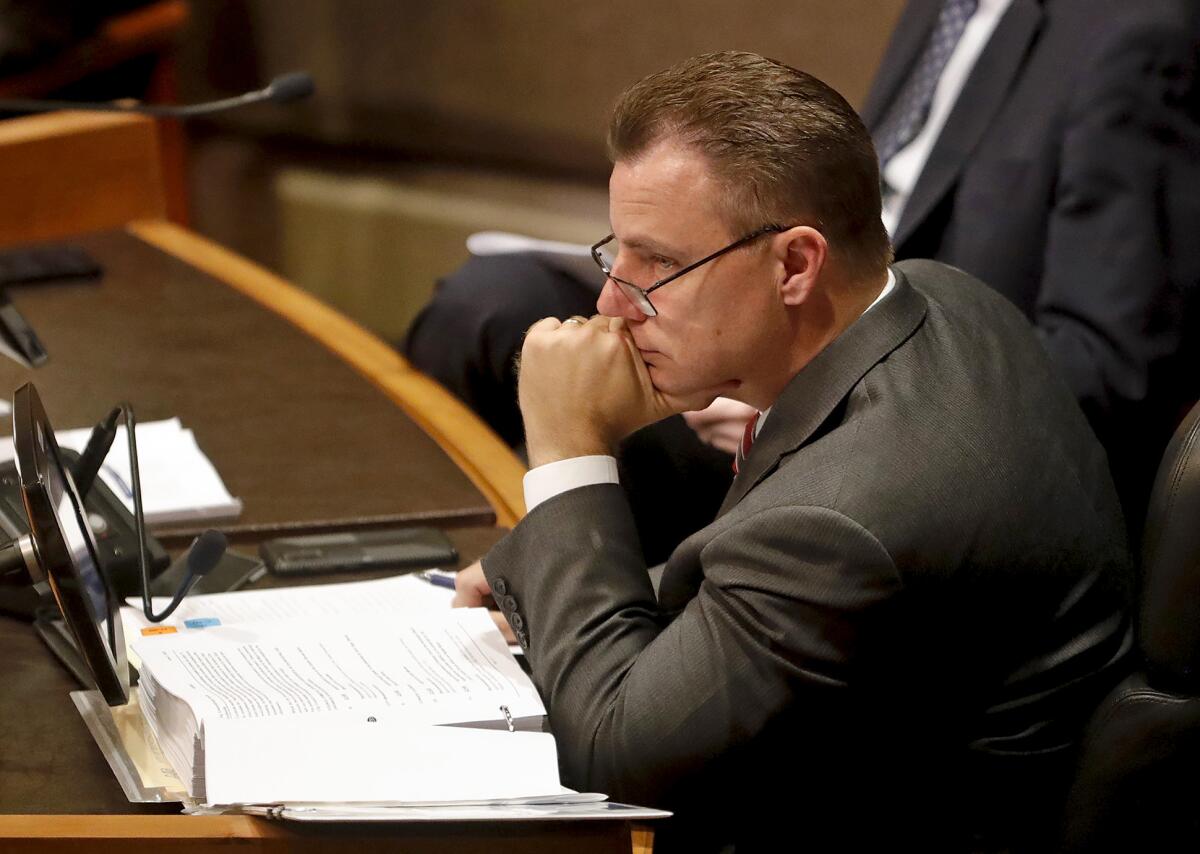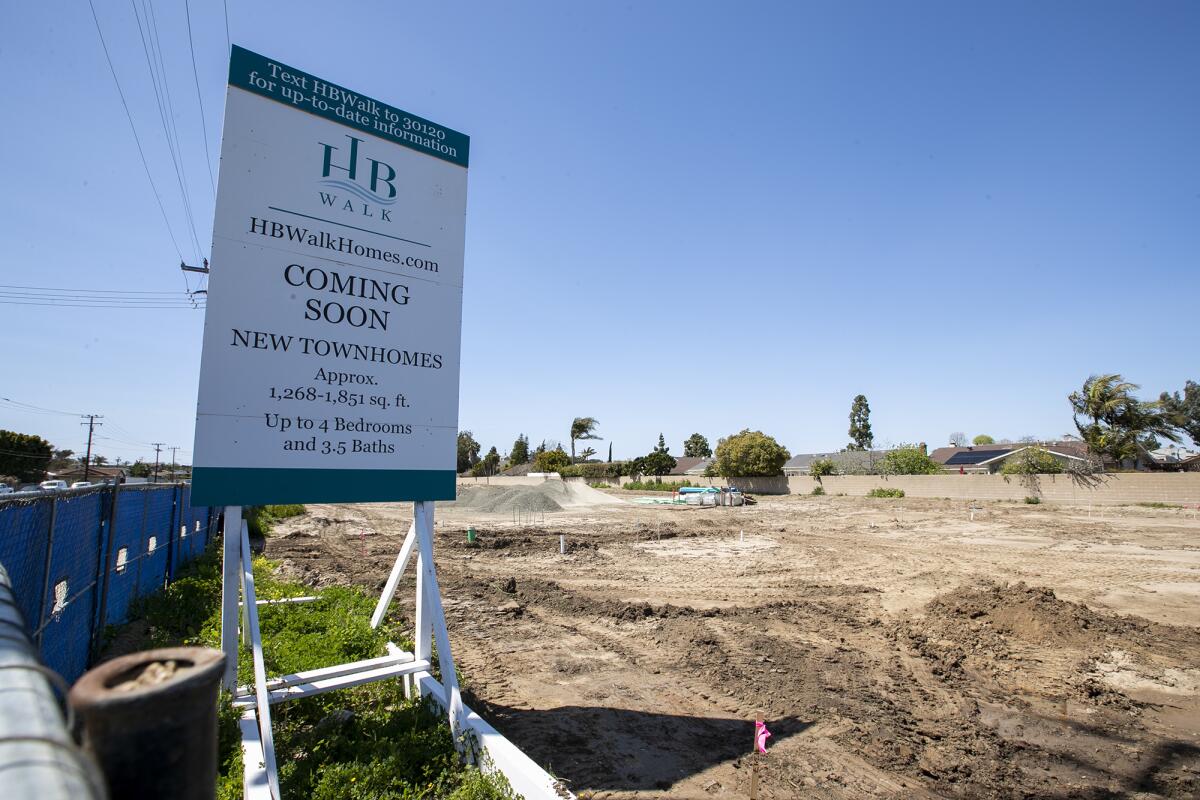U.S. Court of Appeals hears Huntington Beach’s federal case against state housing mandates

- Share via
Huntington Beach City Atty. Michael Gates likened the U.S. 9th Circuit Court of Appeals three-judge panel to a “firing squad.”
The panel brought plenty of bullets while hearing Gates’ case against the state of California’s housing mandates on Monday morning in Pasadena.
“They basically kick the tires on all of the arguments and authorities, really for both sides,” Gates told the Daily Pilot in an interview following the session. “Of all of the appeals I’ve done, this one seemed pretty typical. It’s hard for me to read. You just wait and see for the final ruling.”
The judges — Richard Tallman, Ryan Nelson and Daniel Bress — peppered Gates with questions. Bress jumped early into Gates’ assertion that the state was being “overbearing” and “heavy-handed” in enforcing Huntington Beach’s Regional Housing Needs Assessment requirement to zone for 13,368 units from 2021 to 2029.
“I don’t want to interrupt you, but there is this big question here of can you even bring this lawsuit,” Bress said. “Do you have standing?”
A district court judge ruled last November that Huntington Beach in fact did not have standing in federal court on its suit, City of Huntington Beach et al. vs. Gavin Newsom et al.
Gates, who has said the city’s rights under the 1st and 14th amendments to the U.S. Constitution are being violated, appealed to the 9th Circuit.
Gates argued Monday that precedent cited by the district court, including in the case City of S. Lake Tahoe vs. California Tahoe Reg’l Plan. Agency (1980), did not apply because South Lake Tahoe is not a charter city like Huntington Beach — rather, it is a “political subdivision” of the state.
Nelson said he was sympathetic to Gates’ argument but noted a ruling in a 1998 case, Burbank-Glendale-Pasadena Airport vs. Burbank, that even charter cities in California can be designated as political subdivisions.

Gates responded that the case involved a Joint Powers Authority between the three cities, and did not present a full-scale analysis on the legal character of a charter city.
“That [JPA] is, actually, a political subdivision of the state because it’s created by statute,” Gates said. “Charter cities are not created by statute, your honor, they’re created by the California Constitution.”
He cited Otis vs. City of Los Angeles (1942), which states that counties are political subdivisions but charter cities are in a sense “independent political organizations.” Gates also cited Johnson vs. Bradley (1992), a decision that refers to the 1880 People vs. Hoge case, which states that the drafters of the state Constitution emancipated charter cities from the authority of the California Legislature.
The judges seemed skeptical of this argument.
“They’re not emancipated from the standpoint of the federal constitution,” Bress said. “The city of Huntington Beach is not some free-floating entity that gets to do whatever it wants and call itself whatever it wants and is not a city of the state of California. I just don’t understand this argument.”
Tallman said Gates didn’t need a federal answer but rather a state answer on the powers of a charter city.
Thomas Kinzinger, an attorney with the California Attorney General’s office, presented for the defense.
“Adopting a city charter did not make [Huntington Beach] into the 51st state,” Kinzinger said. “It’s a derivative government.”
The state’s related lawsuit against Huntington Beach, originally filed in March 2023, is in the Court of Appeal in San Diego. A San Diego Superior Court judge ruled against Huntington Beach in May, stating that Surf City must plan for more housing and pass a compliant housing element within 120 days, but Gates appealed.
Gates said that the decision on Monday’s appeal could take anywhere from a few weeks to a few months. In court, he told the panel that the case was one of first impression, meaning that it presents a new issue for legal interpretation.
“If the 9th Circuit is going to rule against us, they could find a number of ways to rule against us,” he told the Daily Pilot. “But if they’re going to, it cannot rely on South Lake Tahoe and it cannot rely on Burbank, which are the only two cases basically that the lower federal court relied on. I don’t even think, as a matter of law, that’s a close call. To me, that’s very, very clear.”
All the latest on Orange County from Orange County.
Get our free TimesOC newsletter.
You may occasionally receive promotional content from the Daily Pilot.




